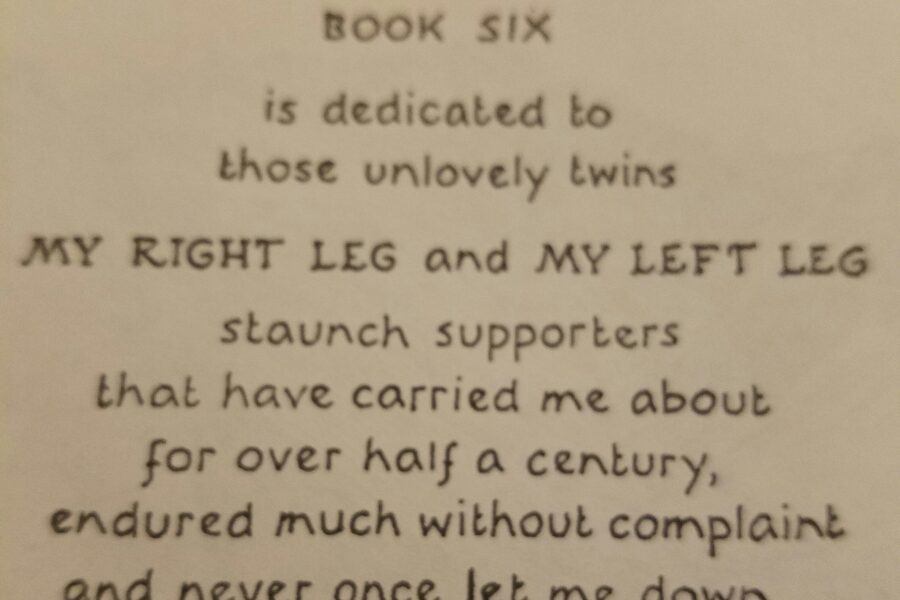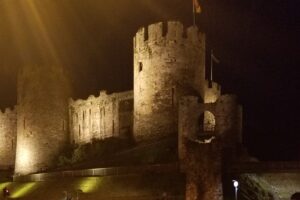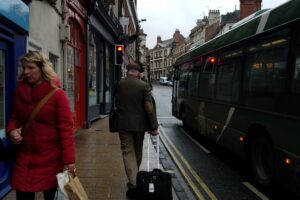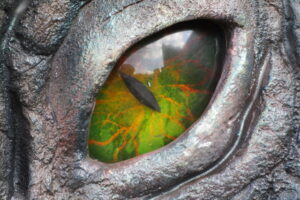Giving up on sleep, I quietly slip out of bed, walk to the living room and open the sliding glass door leading to the balcony. The giant trees that surround the grounds are still as death. Midnight black sky peeks through wispy, powder-gray, low lying clouds. The ground is dry. Where is the adventure in that, I think, as I remember the lecture from last night and the guest speaker telling of his friend leading a group of individuals up a fell at midnight because they want to experience climbing in 90 mph winds at the peak—seizing the day. Perhaps carpe noctem.
When Michael suggested climbing the hill in back of the apartment, I looked at him like he was crazy.

View of the hill in back of our apartment from our third story window.
We arrive early, to a totally deserted manor house. Not because we want to, but because we have the time mixed up. Perhaps it is a good thing. We have our choice of seats. With not a soul in sight we choose what we consider the best, reserving them with coats and scarves. We wander. The lecture starts at 7:30 and we are forty minutes early.


Michael asks, “Who is this lecture about?”
“Alfred Wainwright.”
“And who is he?”
“I don’t know—the man who built Merlewood? Whoever he is, it’s bound to be interesting.”
Two other couples arrive. I think they will be joining us, but they are late arrivals, English tourists, just beginning their Lakes District vacation, trying to find the key to their apartment. I help. Somehow I know how to help—all the while explaining, “I really don’t know what I am doing, but maybe…”—and they are grateful.
The room fills with people who know what they are here for, more than familiar with Alfred Wainwright, and they sit on the edge of their seats, poised to ask questions. It takes a while for my ear to become accustomed to the English accent and soft voice of David Collinson, and when I do—for awhile—I am still not sure who Alfred Wainwright is, or was. We are told what Mr. Wainwright DID NOT love—it is a long list—and finally, a book is held in our lecturer’s hand, lifted high for all to see, and we are told, “This is what he loved.” And I am not sure if it is the book itself, or what the book is about.

I never heard of a fell till this week, thinking only it was the past tense of fall—unfortunately I know about falling, being a born klutz. But the English fell is a high and barren landscape. i.e., a mountain range or moor-covered hills. And there is a cult following of fell walkers and fell runners for Alfred Wainwright—the man and his books—who climbed at least one of 214 fells in the Lakes District each weekend between 1955 and 1966, then went home and wrote and illustrated what he did and what he saw.
And I can’t even appreciate how remarkable this is till I hold one of the seven books myself and see that it is hand illustrated, and hand written. Hand written so neatly that from afar, I thought it was printer’s typeset that had formed the words on the pages. I still don’t know if Wainwright’s love was for his books or for the fells. I do believe he loved them both. But this lecture is about more than Alfred Wainwright, it is about the remarkable men—including the one before me—that possess the same passion for the fells and the mountains beyond and around the world.

After two hours of listening, I am in awe, wondering from where their zeal and strength was wrought. There is Joss Naylor—who our speaker refers to as talented—and I think there really is a Superman when I hear of his feats; tackling 72 of the Wainwright peaks—100 miles and 38,000 ascending feet in less than 24 hours. And when he was 50 he completed climbing/running all 214 Wainwright Peaks in 7 days. But, he also climbed Everest and everything in between and beyond; and broke his ankles and still kept going in order to survive.
And then there is the man sitting here before me. A 59 year old lawyer living in the Lakes District, who started walking the fells when he was fifteen. Diagnosed with brain cancer eight years ago, his doctor told him he needed to do something to get his mind off his illness. So he trained and he walked. He walked 220-miles for charity, climbing 39 mountains in 13 days. And wrote a book, and gave those proceeds to charity too, to which he is also giving the proceeds of tonight’s lecture.

David Collinson, Lawyer. Fell Walker. Author. Cancer Survivor.
And I’m glad I’m here, and I’m glad I came. To England. To the Lakes District. To Merlewood. To this lecture. I’m glad I met Alfred Wainwright and David Collinson. Hearing their stories. Absorbing their zeal for living, for the land.
I have a lot of Googling to do.

Alfred Wainwright










Leave a Reply
Your email is safe with us.